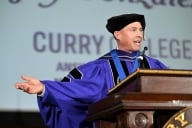You have /5 articles left.
Sign up for a free account or log in.

iStock
A college degree remains the safest ticket to a well-paying job. But growth in the wage gap between degree holders and people without a college credential has slowed since the 1980s, with almost no gain since 2010.
The National Bureau of Economic Research has published a new study that examines two theories for why increases in the higher education “wage premium” have largely ground to a halt.
For workers with a graduate degree, wage premiums over those with a bachelor's or without a college degree leveled off in 2010, wrote Robert G. Valletta, the study’s author and vice president of the economic research department for the Federal Reserve Bank of San Francisco. That stagnation began around 2000 for workers who hold only a four-year degree.
The study found evidence that labor market polarization and skill downgrading has contributed to the flattening of the higher education wage premium.
The polarization theory is related to broader economic explanations for the erosion of middle-income jobs. It says evolving workplace technologies undermine demand for “routine” jobs, the study said, in which workers can be replaced by “computer-intensive capital equipment and processes.”
These jobs include bookkeeping and clerical work, as well as blue-collar occupations that feature repetitive production or monitoring, according to the study. And the routine jobs tend to feature midlevel wages and skills.
In contrast, the study said, high-wage occupations involving “nonroutine cognitive” or abstract work tend to be complemented by computer-based technologies rather than replaced by them. Outsourcing and global trade also contribute to the displacement of routine, middle-wage jobs, Valletta wrote.
The other examined contributor to flat wage premiums for college graduates, skill downgrading, is grounded in a slowdown in the economy's information technology investments since 2000, after years of booming growth. That slowdown, according to the theory, has led to weaker demand for cognitive skills in the work force, and a form of credential creep.
“The demand reversal during the bust phase causes high-skilled workers to move down the occupational ladder and replace lower-skill workers, pushing the latter group further down the occupational ladder,” the study said, “and perhaps out of the labor market entirely.”
Labor statistics back both theories, Valletta found.
For example, the study said workers with at least a college degree account for a large and growing share of nonroutine cognitive jobs, holding nearly 70 percent of them by 2014. And largely behind this pattern, according to the paper, is a significant rise in the number of graduate-degree holders with nonroutine jobs -- a description fitting about 90 percent of workers with graduate degrees.
As a result, the flat wage premiums for college degrees appear to be due in part to a leveling off of the “growing complementarity between highly educated labor and new production technologies, especially those that rely on computers and related organizational capital.”
This is particularly true for workers without a graduate degree, the study found.
“Despite the increase in the college-only group’s competitive advantage over lesser-educated individuals within broad occupational groups, their overall wage advantage has been eroded slightly by a shift toward routine jobs,” wrote Valletta. “Over all, the results suggest rising competition between education groups for increasingly scarce well-paid jobs.”
The bottom line, according to Valletta, is a different way of looking at the potential value of a college degree.
“Although higher education may be financially advantageous on average, the flattening of returns as costs have continued to rise suggests that college may be an unfavorable financial investment for rising numbers of individuals,” he wrote.
While the degree's wage premium has flattened, said Anthony Carnevale, it remains high. Carnevale, who directs Georgetown University's Center on Education and the Workforce, said the premium has doubled since the early 1980s. During that same time period the proportion of workers with bachelor's degrees has quadrupled.
“The basic economic rule is that when the supply of something increases, the price drops, but that hasn't happened with the wage premium,” he said via email. “That's remarkable growth in the last 30 years in the demand for skilled workers in the labor market.”







